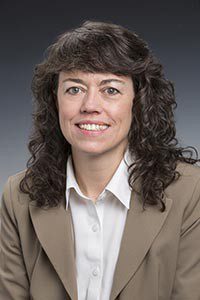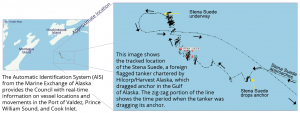By Donna Schantz, Executive Director

Since 2016, there has been an increase in foreign flagged tankers loading Alaska North Slope crude oil from the Valdez Marine Terminal, or VMT. While foreign flagged ships are crewed by licensed and professional mariners, these vessels may introduce increased risk of an accident or oil spill due to the lack of familiarity with the unique environmental conditions or prevention and response systems in our region.
A lack of familiarity with the operating environment appears to have been the cause of an incident in the Gulf of Alaska on April 14 with the foreign flagged tanker, Stena Suede. This unladen vessel arrived ahead of its estimated time to load oil at the VMT, with other tankers scheduled ahead of it.
Instead of the customary response in this situation – picking up a marine pilot at the Bligh Reef station and proceeding to the only designated safe anchorage for large vessels in our region at Knowles Head – the Stena Suede decided to hold off in the Gulf of Alaska. When the winds started to pick up, the crew dropped anchor about 20 miles outside of Hinchinbrook Entrance. Subsequently, they were unable to pull up the anchor due to damaged equipment and the vessel proceeded to drag anchor for more than 24 hours, losing some mooring equipment as well. Once the crew made repairs, they proceeded to the VMT, loaded oil, and left without any further issues.

Foreign flagged tankers, such as the Stena Suede, are vetted prior to taking on oil at the VMT and provided with a number of documents in advance of sailing, including contingency plans, the U.S. Coast Guard vessel traffic system manual, the vessel escort and response plan, and more – over 800 pages in total. While these important documents describe the operating environment and regulatory requirements, it is unrealistic to expect crew members to digest this large amount of material, discern the most relevant pieces, and retain all of the essential safety measures. Additionally, there is commonly understood local knowledge that is not necessarily written down in these plans or perhaps not in a way that highlights their importance.
Licensed marine pilots, such as those stationed at Bligh Reef, are highly trained experts in ship navigation and possess extensive knowledge of the local waterways, including environmental conditions specific to that area. Federal law requires a marine pilot be on board vessels, such as crude oil tankers, when entering bays, rivers, harbors, and ports of the U.S. For the ports and waterways of southwest Alaska, including Prince William Sound, the Southwest Alaska Pilots Association, or SWAPA, provides these services. Their role is to guide ships safely through confined waters, working to ensure the protection of shipping and the marine environment, as well as life and property.
Anchoring outside of ports is common practice around the world. The Stena Suede was in compliance with all applicable regulations as it was outside of state and federal jurisdiction with no requirement for a local marine pilot to be on board at that time. Inadequate communication between the ship and those familiar with the region may have prevented the crew from being warned against setting anchor in the Gulf.
It is the opinion of many marine operators in our region that there is no safe anchorage in the Gulf of Alaska. A letter dated April 22, 2021, from SWAPA to the U.S. Coast Guard pointed out that it is inadvisable to anchor in open waters in the Gulf given the unpredictable environmental conditions which may be encountered at any time of year.
The Stena Suede incident fortunately did not result in an accident or oil spill, but it put a spotlight on a potential weak link in the robust safety systems of our region. SWAPA has clarified their guidance for anchoring large seagoing vessels and plans to recommend updates to NOAA’s Alaska Coast Pilot. Industry representatives have also said they are looking at ways to improve the process of conveying important regional safety information to foreign flagged vessels. PWSRCAC plans to monitor these developments and provide input. We must all remain vigilant and be willing to use lessons learned to continuously improve our regional safety systems designed to prevent oil spills.